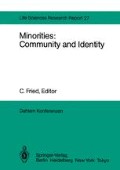Abstract
Ethnicity is defined as the process resulting from the interplay of two kinds of social concourses: an inner, intersubjective concourse between the individual and a we-group, and an outer structural concourse involving the individual and we-group on the one hand and, on the other, the wider world or out-group. The inner concourse begins with consciousness of a shared crisis of alienation resolved through a commitment to the group sharing the crisis, one symbolically validated as a large endogamous kindred with a common memory. The outer concourse takes account of the sources of the crisis, its context and timing, the resources of the potential group, the arithmetic of its social relations with the wider society, and the policy of its leadership. Specific configurations of these two sets of factors determine the kind of ethnic movement and resulting ethnic groups. A consideration of the dangers of ethnic mobilization is followed by a concluding section on the sociology of ethnic knowledge.
Access this chapter
Tax calculation will be finalised at checkout
Purchases are for personal use only
Preview
Unable to display preview. Download preview PDF.
NOTES
Cronon, E. 1955. Black Moses: Marcus Garvey and the Universal Negro Improvement Association. Madison: University of Wisconsin Press. See also Cruse, H. 1967. The Crisis of the Negro Intellectual. New York: William Morrow and Company.
Greeley, A. 1974. Ethnicity in the United States. New York: Wiley and Sons.
Jessel, L. 1978. The Ethnic Process: An Evolutionary Concept of Languages and Peoples. Hawthorne, NY: Mouton.
Kallen, H. 1924. Culture and Democracy in the United States. New York: Boni and Liveright.
Lieberson, S. 1980. A Piece of the Pie: Blacks and White Immigrants Since 1880. Berkeley: University of California Press.
Novak, M. 1971. The Rise of the Unmeltable Ethnics. New York: Macmillan.
Patterson, O. 1975. Context and choice in ethnic allegiance. In N. Glazer and D.P. Moynihan, eds., Ethnicity: Theory and Experience, Ch. 10. Cambridge: Harvard University Press.
Patterson, O. 1977. Ethnic Chauvinism: The Reactionary Impulse. New York: Stein and Day.
Rytina, S. and Morgan, D. 1982. The arithmetic of social relations: the interplay of category and network. Am.J.Sociol. 88 (1): 88–113. (For two earlier theoretical formulations which take account of absolute numbers and percentages in minority-majority relations, see: Blalock, H.M. 1967. Toward a Theory of Minority Group Relations. New York: John Wiley and Sons; Blalock, H.M. 1982. Race and Ethnic Relations. Englewood Cliffs, NJ: Prentice Hall; and Granovetter,M. 1976. Network sampling: some first steps. Am.J.Sociol. 81: 1287–1303.
Smith, M.G.; Augier, R.; and Nettleford, R. 1960. Report on the Rastafari Movement in Kingston, Jamaica. Kingston: Institute of Social and Economic Research.
Sowell, T. 1981. Ethnic America. New York: Basic Books. (For an excellent critique of this work, see Waldinger, R. 1982. The ethnic as self- made man: a review article. Soc.Pol. 13:1.)
Weigel, G. 1959. The Modem God: Faith in a Secular Culture, pp. 15–16. New York: Macmillan.
Author information
Authors and Affiliations
Editor information
Rights and permissions
Copyright information
© 1983 Dr. S. Bernhard, Dahlem Konferenzen, Berlin
About this paper
Cite this paper
Patterson, O. (1983). The Nature, Causes, and Implications of Ethnic Identification. In: Fried, C. (eds) Minorities: Community and Identity. Life Sciences Research Reports, vol 27. Springer, Berlin, Heidelberg. https://doi.org/10.1007/978-3-642-69311-3_3
Download citation
DOI: https://doi.org/10.1007/978-3-642-69311-3_3
Publisher Name: Springer, Berlin, Heidelberg
Print ISBN: 978-3-642-69313-7
Online ISBN: 978-3-642-69311-3
eBook Packages: Springer Book Archive

